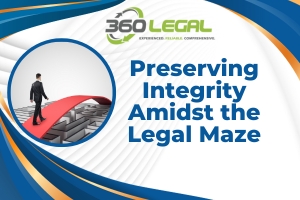Testing RSS Feeds.. ignore post.
Testing RSS Feeds.. ignore post.
Preserving Integrity Amidst the Legal Maze

The legal world is an intricate tapestry of rules, regulations, and procedures. For a process serving company, navigating this maze can be especially challenging. However, maintaining integrity throughout this journey is not just a moral obligation; it’s the foundation upon which trust is built. Integrity ensures that due process is followed, rights are protected, and justice is served.
The Role of a Process Serving Company
Before delving into the essence of integrity, it’s crucial to understand the role of a process serving company. They are responsible for serving legal documents such as summons, complaints, subpoenas, and other court papers to individuals involved in a lawsuit. It is an essential part of the legal process to ensure that individuals are informed about their involvement in legal proceedings.
The Importance of Integrity
Integrity is the adherence to moral and ethical principles. In the context of process serving:
- Trustworthiness: Legal proceedings depend on the accuracy and reliability of the information provided. If a process serving company falters in its duty, it can jeopardize the entire case.
- Upholding the Law: Process servers must always operate within the confines of the law. This includes respecting privacy laws, trespassing rules, and specific regulations about how and when papers can be served.
- Professional Reputation: Integrity fosters trust with clients. Law firms and individual attorneys rely on process servers to carry out their tasks diligently. A lapse in integrity can lead to loss of business and a tainted reputation in the industry.
Potential Challenges to Integrity
Several challenges can test a process server’s integrity:
- Difficult Recipients: Some individuals, upon learning they are being served, might become aggressive or evasive. This can tempt a process server to cut corners or even falsify documents.
- Pressure from Clients: Sometimes, clients might push for faster results, tempting the server to bypass certain legal procedures.
- Complex Regulations: The myriad of rules and regulations, which might vary by jurisdiction, can be daunting. There might be temptations to sidestep some rules for the sake of expediency.
DRAMATIZATION AND IS NOT AN ACTUAL EVENT: Jenna was a process server with over five years of experience. One day, she was assigned to serve court papers to Mr. Roberts, a businessman known for his evasive tactics. Upon reaching his residence, Jenna was told he was out of the country. The housekeeper, however, hinted that he might be in his downtown office, hiding. Feeling the pressure to complete her assignment, Jenna considered sneaking into the office after hours, thinking it might be the only way to catch Mr. Roberts. However, realizing that this would be trespassing and against her company’s code of conduct, she decided against it. Instead, Jenna did some research and discovered that Mr. Roberts was attending a public event the next week. Armed with this information, she approached him at the event and successfully served the papers, all while staying within the bounds of the law.*
Strategies to Maintain Integrity
- Training and Continuous Learning: Regular training sessions can help process servers stay updated on laws and best practices, ensuring they always operate within legal parameters.
- Peer Support: Encouraging an environment where process servers can discuss challenges and seek advice from peers can deter potential misconduct.
- Clear Company Policies: Having a clear set of guidelines and consequences for breaches of integrity can deter unscrupulous behavior.
- Open Communication with Clients: Being transparent with clients about the challenges faced and the steps taken can foster mutual understanding and reduce undue pressure.
The Intersection of Technology and Integrity
In today’s digital age, technology has undeniably made its mark on almost every industry, and process serving is no exception. From tracking recipients to electronic document management, technology plays a pivotal role in streamlining tasks. However, with these advancements come new challenges and dilemmas related to integrity.
Digital Proof of Service
Many process serving companies now utilize digital tools to provide evidence that documents have been served. GPS tracking, time-stamped photos, and electronic signatures can offer irrefutable proof of service. This not only ensures accuracy but also minimizes disputes.
DRAMATIZATION AND IS NOT AN ACTUAL EVENT: Lucas, a process server, was trying to serve papers to Ms. Green, who was notorious for contesting service claims. Armed with a digital device that recorded the exact time, date, and GPS location of his service attempts, Lucas was able to provide incontrovertible evidence when he finally handed over the documents to her. When Ms. Green later tried to contest in court claiming she was never served, the digital evidence stood strong in Lucas’s favor.
Ethical Use of Surveillance Technology
While technology offers enhanced tracking and surveillance capabilities, it also presents ethical challenges. For instance, using technology to track an individual’s every move or delving too deep into their digital footprints without cause can border on invasion of privacy. Process servers must tread carefully, balancing the need for information with respect for individual privacy rights.
The following is a DRAMATIZATION AND IS NOT AN ACTUAL EVENT: Emma, a seasoned process server, had been finding it hard to locate a particular recipient. She considered using a relatively new software that claimed to trace a person’s digital activities to determine their whereabouts. However, after evaluating the potential privacy invasions the software might cause, she decided to rely on traditional investigative methods.
Emphasizing Empathy in Service
While the primary role of a process server is to deliver legal documents, they are also human beings interacting with other human beings, often during stressful times. Balancing professionalism with empathy ensures that the job is done without causing undue distress to the individuals involved.
Understanding the Emotional Weight
Being served with legal documents can be an emotionally charged event for many. Recognizing the emotional weight of the situation and approaching individuals with compassion can not only make the process smoother but also uphold the dignity of all parties involved.
The following is a DRAMATIZATION AND IS NOT AN ACTUAL EVENT: Daniel, a process server, had the difficult task of serving divorce papers. When he approached the recipient, Mrs. Clark, he could see the distress in her eyes. Instead of being abrupt, Daniel spoke calmly, offering her a moment to compose herself before proceeding.
Going Beyond the Call of Duty
Sometimes, simply serving the papers isn’t enough. There might be instances where the recipient has questions or needs further directions on what to do next. While process servers aren’t legal advisors, pointing individuals in the right direction or offering a word of reassurance can make a world of difference.
The following is a DRAMATIZATION AND IS NOT AN ACTUAL EVENT: Maya had just served eviction papers to a young mother of two. Seeing the panic in the woman’s eyes, Maya took a moment to inform her about local agencies that might offer assistance. While it wasn’t her responsibility, that simple act of kindness provided the woman some direction during a challenging time.
Conclusion
Integrity is the backbone of the legal system, and for process serving companies, it is the beacon that guides every action. While the legal maze is intricate and often challenging, preserving one’s integrity ensures that justice is not only served but is also seen to be served. The reputation of a process server and the trust of the community hinge on this unwavering commitment to the highest standards of professional conduct.
Author
We are Social!
Latest tweets
Popular Tags
Testimonials
"5 star service ! prompt serving, helpful, professional . "
"Mike is awesome. Our firm has hired him on several occasions and we are very happy with his work. His prompt serving, helpful, professional and always in communication. I recommend him highly! "
"360Legal provides speedy and easy to use Process Service that is flexible, and very transparent with nearly instant reporting. It is very helpful for us to be able to track the status of our process service jobs, especially when they are time sensitive. "
Latest News
-

RMAI 2021 Annual Conference RMAI Annual Conference
April 12-15, 2021 -

NATIONAL CREDITORS BAR ASSOCIATION 2020 SPRING CONFERENCE
May 19-21, 2021 -

ALFN ANSWERS 2021
Jul 18-21, 2021 -

Annual Convention and Expo
Oct. 17-21, 2021 -

Florida Association of Professional Process Servers 33rd Quarter Board Meeting/Professional Beach Getaway
Aug. 20-22, 2021












